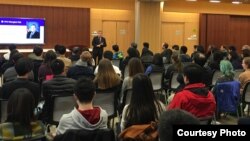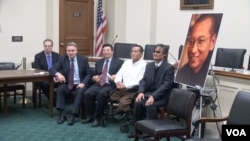A U.S. member of Congress who had been banned from traveling to China for his human rights advocacy visited Shanghai recently. He told VOA that in his speech at New York University's Shanghai campus, he expressed his concerns about China's human rights problems.
"I touched on many of the key issues from Liu Xiaobo to religious freedom to forced abortion and gendercide — the killing of little girls simply because they happen to be little girls, and made an appeal on that one," said Chris Smith, a Republican congressman from New Jersey.
"Rally around the girl child from the standpoint of protection, there is a huge gap, disparity between the males and females in China, far more males than girls or women," he said.
"The three most dangerous words today in China are 'it's a girl,'" he added.
WATCH: Congressman Smith discusses his trip
Forced abortions, gendercide persist
Hours before the interview, Smith met the visiting Chinese Foreign Minister Wang Yi, and raised those human rights issues, including gendercide.
"It's in China's interest to do an aggressive affirmation of women and girls, of the value of the girl child inside the womb, because right now she is being slaughtered en masse, systematically destroyed," he said.
Smith said in his speech he also talked about religious freedom.
"President Xi Jinping talks about the Sinification of religion, which means no contacts with other countries or inter-religionists from other nations," he said. "And you also will have to, as a recognized religious body, comport and conform with the Chinese government agenda. That's not what people of faith are supposed to do."
Smith raised the case of the imprisoned Bishop Su Zhimin with Chinese officials.
"I met Bishop Su in 1994, in a small Beijing apartment," Smith said. "He celebrated Mass. We had a long conversation about what was it like for him when he was in prison suffering for his Christian faith. And I was in awe of this man who had no guile, no anger. His eyes were crystal clear. He looked you in the eyes and he says 'I pray for my captors.'"
Bishop Su remains missing
Smith said Su Zhimin had been missing for more than a decade.
"We don't know if he's dead or alive," he said.
In his speech in Shanghai, Smith told the Chinese audience that if China's human rights practices worsen, it would hurt U.S.-China relations and the Chinese people. The congressman said that China is emerging as a world power, but when China adopts new laws and takes actions to silence dissidents, it will only damage China's international prestige, causing estrangement between the Chinese people and the international community.
Smith has long been concerned about China's human rights situation. He has presided more than 50 congressional hearings on the issue.
The Chinese government blacklisted him, repeatedly rejecting his visa applications. But this time he was invited by New York University Shanghai. The invitation came a few years after a controversy involving the university's decision to stop supporting a Chinese dissident.
In 2012, blind legal activist Chen Guangcheng fled house arrest, and entered the U.S. Embassy in Beijing. He later was allowed to leave China when Beijing and Washington reached an agreement.
Academic freedoms
Chen was funded by New York University when he first came to the United States. He left the university a year later, saying it was because the school was under pressure from the Chinese Communist Party, which raised concerns about safeguarding academic freedoms for American universities that want to establish campuses in China.
Jeffrey Lehman, vice chancellor of New York University Shanghai testified at a congressional hearing that Congressman Smith convened last June. Lehman maintained that the university's branch campus in China enjoyed full academic freedom.
"If it would become impossible to operate with academic freedom, NYU would close down its Shanghai campus," he said.
Lehman also invited Smith to visit the Shanghai campus.
In the past, Smith had been repeatedly refused a visa by the Chinese government. This time, the congressman was granted a visa at the last minute.







